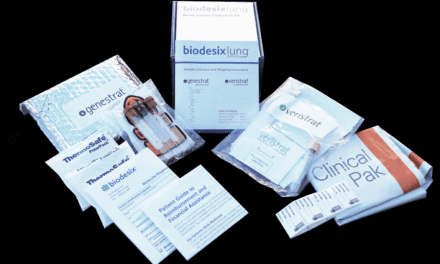The Mercy Halo test demonstrates performance similar to low-dose CT screening with the potential to reach underscreened populations.
A new study suggests that Mercy BioAnalytics’ blood-based lung screening test may enhance early-stage lung cancer detection, particularly among high-risk individuals not currently participating in low-dose CT (LDCT) screening programs.
The study, which used samples from the National Lung Screening Trial (NLST) biorepository, found that the Mercy Halo blood test demonstrated performance comparable to LDCT screening while detecting some cancers missed by imaging.
Mercy researchers performed a blinded evaluation of samples from 48 individuals with primarily LDCT screen-detected cancers, along with matched samples collected from the same individuals during prior annual screening rounds. All samples were evaluated using a pre-specified classifier with test specificity set to 90%, exceeding that reported for LDCT.
Study Highlights:
- In blood samples collected across two sequential rounds of annual screening, the Mercy test score showed an average increase of 79% in detected cases, suggesting potential for longitudinal monitoring.
- The Mercy test detected 31% of lung cancers one year before the in-trial diagnosis, compared to just 8% of cancers that were positive by LDCT/Lung RADS imaging in the year prior to diagnosis. This superiority for earlier detection was observed across all lung cancer histologies.
- The Mercy test identified 40% of cancers that were missed by LDCT when images are interpreted using Lung RADS, the current standard of care interpretation framework.
- The Mercy test detected 34.4% of cancers in the study cohort, comparable to sensitivity observed for LDCT/Lung RADS sensitivity at 39.5%.
Addressing Low Screening Participation
The NLST demonstrated a 20% reduction in lung cancer mortality through annual LDCT screening, leading to its inclusion in clinical guidelines in 2013. However, only 18% of approximately 15 million eligible Americans are up to date with screening, according to the American Lung Association’s 2025 State of Lung Cancer report.
“This study marks a significant step toward expanding lung cancer screening accessibility and effectiveness, potentially transforming early detection strategies for millions of Americans,” says Dawn Mattoon, Mercy’s chief executive officer, in a release. “We’re excited to continue development of this assay as we look to build on our exceptional ovarian cancer test portfolio with the addition of lung cancer indications.”
ID 388782399 © Ahmadrizal7373 | Dreamstime.com





